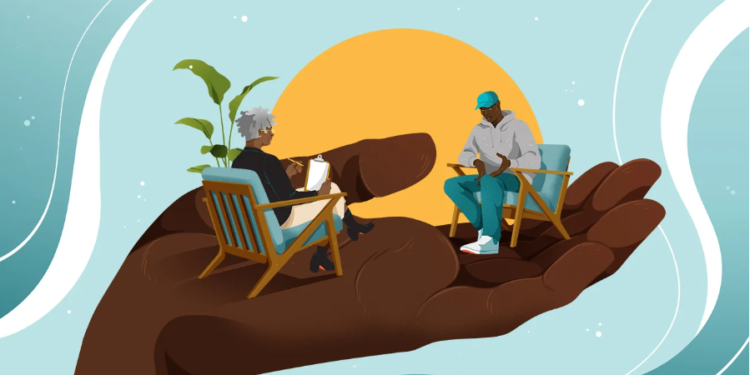Illustration by Brittany England. Img source: www.healthline.com
May 30, 2024 Story by: Editor
Residential segregation is a longstanding manifestation of structural racism in the United States, with Black Americans often residing in low-quality neighborhoods. This segregation contributes to significant disparities in health outcomes. A recent study from the University of Illinois Urbana-Champaign investigates how community stress influences the mental and emotional health of Black men and women in the U.S.
“Community stress encompasses the impact of living in disadvantaged areas, including both objective aspects like buildings in disrepair and lower median income, and subjective aspects such as feeling safe and comfortable in one’s neighborhood,” explained lead author August Jenkins, a postdoctoral research associate in the Department of Human Development and Family Studies, part of the College of Agricultural, Consumer and Environmental Sciences (ACES) at Illinois. “We aimed to explore how both aspects relate to the mental and emotional health of Black Americans and whether there are differences between men and women.”
Jenkins and her team utilized data from the Midlife in the United States (MIDUS) study, a comprehensive longitudinal study focusing on health and aging, which assesses psychological and neighborhood factors. They analyzed data from MIDUS’ third wave (2013-2015), which included a sample of Black Americans from Milwaukee, Wisconsin.
The study assessed objective neighborhood quality using the Area Deprivation Index, which ranks neighborhoods based on education, employment, income, and housing quality indicators. Subjective community stress was measured using self-reported perceptions of neighborhood safety, social cohesion, and the physical environment.
Participants’ mental-emotional health was evaluated through three measures: negative affect, positive affect, and psychological disorders. To assess affect, participants reported the frequency of experiencing various positive and negative emotions over the past 30 days.
As anticipated, the researchers found that individuals reporting higher perceived community stress exhibited more negative emotions and fewer positive emotions. Additionally, Black women (but not men) showed higher odds of psychological disorders. Surprisingly, greater objective community stress correlated with lower levels of negative emotions and reduced odds of clinical disorders, particularly among women.
Explaining this unexpected finding, Jenkins said, “Living in more disadvantaged neighborhoods may foster stronger social connections and networks among Black women. This doesn’t imply that disadvantage benefits Black women’s mental health, but rather that it might necessitate greater reliance on social networks, which can enhance health outcomes.”
She highlighted the geographical context of the sample, noting, “Milwaukee has a profound history of racial residential segregation and high eviction rates among Black women. This context may heighten their awareness of residential surroundings, enhancing resilience and explaining the observed associations between neighborhood characteristics and emotional wellbeing for Black women, but not for Black men.”
Jenkins also pointed out that perceived community stress was linked to psychological disorders for Black women, but not for men. Nonetheless, the adverse effects of perceived community stress on Black men were evident in their emotional responses.
“Research indicates that depression and anxiety might manifest more somatically among Black Americans than typically captured in clinical assessments. Including measures of positive and negative affect in this study provided a more comprehensive view of mental health and functioning for both Black men and women,” she said.
The study emphasizes the need for a holistic approach that considers the intersection of race and gender to better understand the complex relationships between neighborhood quality and wellbeing, Jenkins noted.
“Our findings suggest that fostering social connections and networks within neighborhoods might enhance a sense of agency. However, it remains crucial to address this as a structural issue. We should advocate for policy changes to invest in these communities and mitigate disadvantages, as well as provide clinical interventions and prevention programs to improve mental health outcomes,” she concluded.
The study, titled “Where I’m Livin’ and How I’m Feelin’: Associations among community stress, gender, and mental-emotional health among Black Americans,” is published in *Social Science & Medicine*. Authors include August Jenkins, Agus Surachman, and Marina Armendariz.
This research utilized publicly available data from the MIDUS study, funded by the John D. and Catherine T. MacArthur Foundation Research Network and National Institute on Aging Grants P01-AG020166, U19-AG051426, and R01 AG019239. Agus Surachman was supported by the NIH-funded Drexel FIRST program (U54CA267735). The content is solely the responsibility of the authors and does not necessarily represent the official views of the NIH. Source: College of Agricultural, Consumer and Environmental Sciences

















